(完整word版)动词第三人称单数形式
(完整word版)外研版小学英语语法总复习知识点归纳

(完整word版)外研版小学英语语法总复习知识点归纳外研版小学英语语法总复知识点归纳一、时态1.一般现在时(1)表示经常发生的动作或事情,通常用“usually通常,often常常,every…每…。
sometimes有时,always总是,”等词。
(2)基本结构:主语I / You / We / They /He / She / It肯定句:主语+动词原形或动词第三人称单数形式否定句:主语+don’t + 动词原形或者doesn’t + 动原一般疑问句(Yes/No) Do…。
Yes。
I do.No,I don’t.Does…(动词原形)…?Yes,he/she does。
No,he/she doesn’t.特殊疑问句What do …。
How does she…(动词原形)…?(3)动词第三人称单数方式(同名词单数酿成复数办法不异)1.普通情形+s如:walk-walks2.辅音字母+y结尾去y +ies fly-flies3.结尾是s。
x,sh。
ch +es watch-watches4.结尾是0 +es do-does。
go-goes5.特殊have-has2.现在进行时(1)表示正在发生的动作,通常用“now现在。
look看,XXX听”.(2)根本方式: be +动词-ingeg: I am(not) XXX.You/We/They are(not) reading。
He/She/It is(not) eating.What are you doing。
Is he reading?(3)动词的目前分词方式(动词+ing)普通情形+ing walk—walking末端是不发音的e-e+ingcome—coming重读闭音节双写末了一个字母+ingswim-swimming。
run-running3.一般过去时(1)表示过去已经发生的事情,通常用“last …上一个…。
just now刚才,many years ago许多年前,XXX昨天”等词。
英语中的十六种时态(可编辑修改word版)
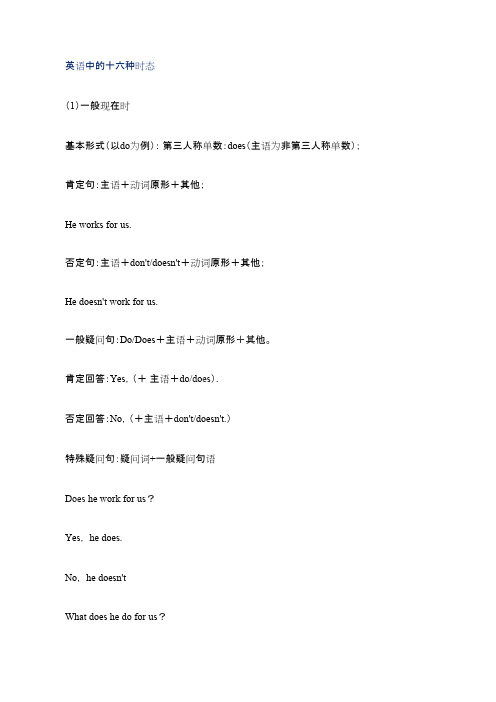
英语中的十六种时态(1)一般现在时基本形式(以do为例):第三人称单数:does(主语为非第三人称单数);肯定句:主语+动词原形+其他;He works for us.否定句:主语+don't/doesn't+动词原形+其他;He doesn't work for us.一般疑问句:Do/Does+主语+动词原形+其他。
肯定回答:Yes,(+主语+do/does).否定回答:No,(+主语+don't/doesn't.)特殊疑问句:疑问词+一般疑问句语Does he work for us?Yes, he does.No, he doesn'tWhat does he do for us?He works for us.(2)一般过去时be动词+行为动词的过去式否定句式:在行为动词前加didn't,同时还原行为动词,或was/were+not;was或were放于句首;用助动词do的过去式did提问,同时还原行为动词例如: Did he work for us?He didn't work for us.He worked for us.(3)一般将来时am/are/is+going to+do 或will/shall+doam/is/are/about to + doam/is/are to + do;一般将来时的表达方法be going to +动词原形be +不定式,be to+动词原形,be about to +动词原形be able to +不定式be about to+动词原形will + 动词原形;例如:He is going to work for us.He will work for us;He is coming.这是特殊的用一般现在时表达将来时态的例子!!(4)过去将来时be(was,were)going to+动词原形be(was,were)about to+动词原形be(was,were)to+动词原形肯定句:主语+be(was,were)going to+动词原形~.否定句:主语+be(was,were)not going to+动词原形~.疑问句:Be(Was,Were)+主语+going to+动词原形~?肯定句:主语+would(should)+动词原形~.否定句:主语+would(should)not+动词原形~.疑问句:Would(Should)+主语+动词原形~?He would work for us.(5)现在进行时主语+be+v.ing〔现在分词〕形式(其中v表示动词)表示现在正在进行的动作或最近在做的事。
(完整word版)动词的三单形式、现在分词、过去式、过去分词的变化规律
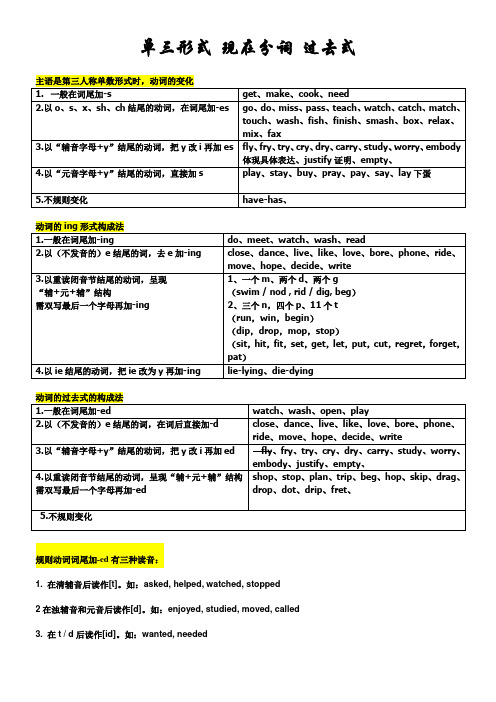
单三形式现在分词过去式规则动词词尾加-ed有三种读音:1. 在清辅音后读作[t]。
如:asked, helped, watched, stopped2在浊辅音和元音后读作[d]。
如:enjoyed, studied, moved, called3. 在t / d后读作[id]。
如:wanted, needed不规则动词的过去式见课本后的不规则动词表。
大体上归纳有以下几条记忆法:1. 以t结尾的词,过去式与原形相同。
如:put—put, let—let, cut—cut, beat—beat,cost—cost,hit—hit2. 以d结尾的词,把d变成t。
如:build—built, lend—lent, send—sent, spend—spent (read—read)3. 以n结尾的词,在词后加t。
如:mean—meant, burn—burnt, learn—learnt4. 以ow / aw结尾的词,把ow / aw变成ew。
如:blow—blew, draw—drew, know—knew, grow—grew,throw—threw5. 含有双写字母的词,将双写改为单写,在词尾加t。
如:keep—kept, sleep—slept, feel—felt, smell—smelt,sweep—swept6.只去掉一个e:feed—fed,meet—met7. 闭音节词,改i为a。
如:sit—sat, swim—swam, ring—rang, drink—drank,sing—sang,begin—began,8. 开音节词,改i为o。
如:drive—drove, ride—rode, write—wrote,9.buy—bought, bring—brought, think—thought, catch—caught, teach—taughty—laid, say—said, pay—paid母鸡“下蛋”并“摆放”好后,“说”,“付钱”11.is/am—was, are—were, have/has—had, do—did, go—went, run—ran, see—saw, fly—flew, get—got, win—won, eat—ate, come—came, make—made, tell—told, take—took, fall—fell, speak—spoke, wear—wore, stand—stood, become—became, forget—forgot, hear—heard,can—could, will—would, shall—should, find—found。
动词第三人称单数

.
• 6._____she_____(come)from America? • 7._____the girl_____(look)out of the window and sees many birds in the sky? • 8._____Jenny (run) home and_____(sit)on the chair? • 9. My father is very strong. He can (carry) heavy box easily.
动词短语: +s: Plays, sings, gives, starts, likes, buys some toys, gets up comes back home makes noodles, eats lunch drinks coffee begins his class +es : watches TV brushes his teeth goes to bed goes to school does my homework does some reading y→ i+ es: fly → flies study →studies
• 6.当数字或字母作主语时,看作第三人称单 数。如: • ①“6” is a lucky number. “6”是个吉利数 字。 • ②"I" is a letter. "I"是个字母。 •
• 动词原形变第三人称单数的规则与发音规律同名 词单数变复数大致相同 • 1、大多数动词在词尾加“S”如:①stop-stops [s] ; make-makes [s]②read-reads [z] ; play- plays [z] • 2、以辅音字母加“y”结尾的,要先将“y”变为 “i”,然后在加“es”读[iz] • 如:fly-flies [z]; carry-carries [z] • study-studies [z]; worry-worries •
(完整word版)一般现在时习题
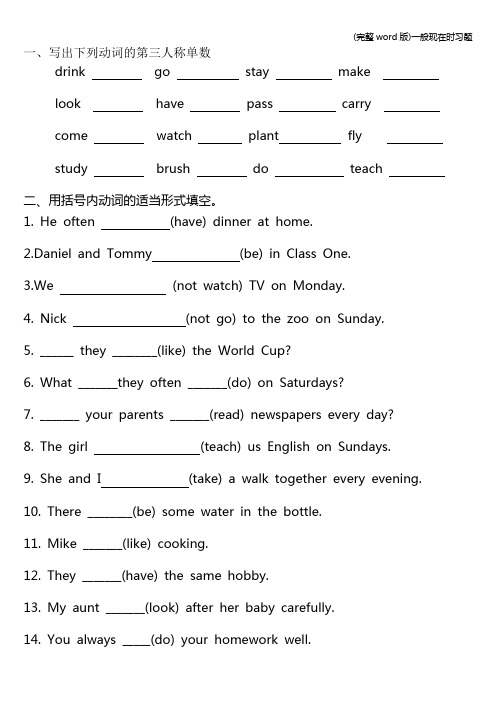
一、写出下列动词的第三人称单数drink go stay makelook have pass carrycome watch plant flystudy brush do teach二、用括号内动词的适当形式填空。
1. He often (have) dinner at home.2.Daniel and Tommy (be) in Class One.3.We (not watch) TV on Monday.4. Nick (not go) to the zoo on Sunday.5. ______ they ________(like) the World Cup?6. What _______they often _______(do) on Saturdays?7. _______ your parents _______(read) newspapers every day?8. The girl (teach) us English on Sundays.9. She and I (take) a walk together every evening.10. There ________(be) some water in the bottle.11. Mike _______(like) cooking.12. They _______(have) the same hobby.13. My aunt _______(look) after her baby carefully.14. You always _____(do) your homework well.15.I (be) ill. I’m staying in bed.16. She __________(go) to school from Monday to Friday.17. Liu Tao _______(do) not like PE.18. The child often ____________(watch) TV in the evening.19. Su Hai and Su Yang ___________(have) eight lessons this term.20. -What day ____________(be) it today? -It’s Saturda.三、按照要求改写句子1. Daniel watches TV every evening.(改为否定句)2. I do my homework every day.(改为一般疑问句,作否定回答)3. She likes milk.(改为一般疑问句,作肯定回答)4. Amy likes playing computer games.(改为一般疑问句,作否定回答)5. We go to school every morning.(改为否定句)6. He speaks English very well.(改为否定句)7. I like taking photos in the park.(对划线部分提问)8. John comes from Canada.(对划线部分提问)9. She is always a good student.(改为一般疑问句,作否定回答)10. Simon and Daniel like going skating.(改为否定句)四、改错(划出错误的地方,将正确的写在横线上)1. Is your brother speak English? __________________2. Does he likes going fishing? __________________3. He like playing games after class. __________________4. Mr. Wu teachs us English. __________________5. She don’t do her homework on Sundays. _________________一般现在时态精讲精练1. 用法①表示现在的特征或状态例:He is 12 years old. 他现在12岁。
(完整word版)一般现在时态
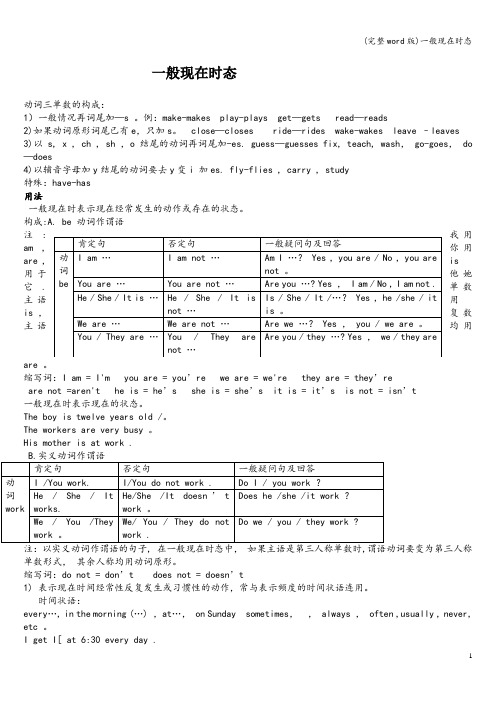
一般现在时态动词三单数的构成:1)一般情况再词尾加—s 。
例:make-makes play-plays get—gets read—reads2)如果动词原形词尾已有e,只加s。
close—closes ride—rides wake-wakes leave –leaves3)以s, x , ch , sh ,o 结尾的动词再词尾加-es. guess—guesses fix, teach, wash, go-goes, do —does4)以辅音字母加y结尾的动词要去y变i 加es. fly-flies , carry , study特殊:have-has用法一般现在时表示现在经常发生的动作或存在的状态。
构成:A. be 动词作谓语注: 我用Array am , 你用are , is用于他她它.单数主语用is ,复数主语均用are 。
缩写词:I am = I'm you are = you’re we are = we're they are = they’reare not =aren't he is = he’s she is = she’s it is = it’s is not = isn’t一般现在时表示现在的状态。
The boy is twelve years old /。
The workers are very busy 。
His mother is at work .单数形式,其余人称均用动词原形。
缩写词:do not = don’t does not = doesn’t1) 表示现在时间经常性反复发生或习惯性的动作,常与表示频度的时间状语连用。
时间状语:every…, in the morning (…) ,at…, on Sunday sometimes,, always , often ,usually , never, etc 。
I get I[ at 6:30 every day .She always helps others .He often goes to school on foot.I usually leave home for school at 7 every morning。
(完整版)初一英语动词第三人称单数形式的练习(可编辑修改word版)

(完整版)初⼀英语动词第三⼈称单数形式的练习(可编辑修改word版)写出下列动词的第三⼈称单数。
drink have plantgopassflystaycarrystudymakecomebrushlookwatchteach⼆、把下列动词变为第三⼈称单数形式。
1. clean--2. go--3. have--4. do--5. play--6. fly--7. come-- 8. brush-- 9. watch-- 10. study-- 11. ask-- 12. answer-- 13. swim-- 14. catch-- 15. write-- 16. eat-- 17. make-- 18. paint--19. learn-- 20. phone-- 21. run--三、⽤括号内动词的适当形式填空。
1.He often (have) dinner at home.2.We (not watch) TV on Monday.3.Nick (not go) to the zoo on Sunday.4. they (like) the World Cup?5.W hat they often (do) on Saturdays?6.your parents (read) newspapers every day?7.The girl (teach) us English on Sundays.8.She and I (take) a walk together every evening.9.There (be) some water in the bottle.10.Mike (like) cooking.11.They (have) the same hobby.12.My aunt (look) after her baby carefully.13.You always (do) your homework well.14.I (be) ill. I’m staying in bed.15.She (go) to school from Monday to Friday.16.Liu Tao (do) not like PE.17.The child often (watch) TV in the evening.18.Su Hai and Su Yang (have) eight lessons this term.19Mike’s sister (cook) nice food. I (like) eating it very much.20 (do) your father (watch) TV in the evening? No, he (not).21 Tom usually (play) football after school22 He (live) in a small town near Nanjing.23 I like (cook) and (grow) flowers.24 I (go ) to school by bus, and he (go) to school by bike.25 Who (sing) beautifully in your class? Jim.四、选出正确的答案:1.She (like / likes) to play football.2. He (like / likes) drinking milk.3. I (like / likes) to watch TV.4. We (like / likes) to play badminton.5. They (like / likes) to sing songs.6. She (read / reads) books every day.7.He (play / plays) computer games every day.8.It (listen / listens) to the radio every day.9.Linda (draw / draws) pictures every day.10.Jane and Linda (play / plays) football every day.五、选择题:1.I to school every day.A.goB. goesC. going2.He teeth every morning.A.brushB. brushesC. brushing3.The birds singing.A.likeB. likesC. like to4.What does Lily doing?A.likeB. likesC. to5. you like eating apples?A.DoB. DoesC. Doing6. he swim every afternoon?A.DoB. DoesC. Doing7.Tom likes in the classroom.A. singingB. singC. to singing8.–Does Sally like swimming? --No, she .9.Peter and Mary milk every day.A.drinkB. drinkingC. drinks10. they read English every day?A.DoesB. ToC. Do六、把下列句⼦变为否定句:1.She draws pictures every day.2. We like playing football.3 Linda swims every day.4 They like playing games.5. My father reads newspaper in the evening.6. He likes drawing pictures .七、把下列句⼦变为疑问句,并做肯定回答。
(完整word版)名词变复数、动词三单形式现在分词过去分词过去式变化及形容词副词级别变化
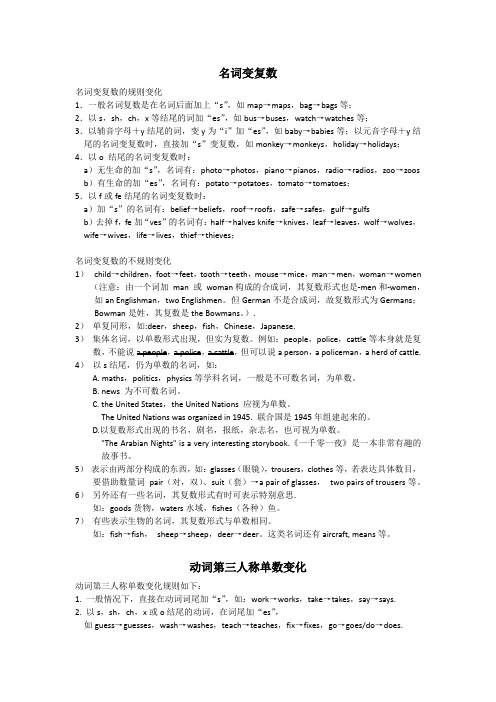
名词变复数的不规则变化
1)child→children,foot→feet,tooth→teeth,mouse→mice,man→men,woman→women
2.以s,sh,ch,x或o结尾的动词,在词尾加“es”,
如guess→guesses,wash→washes,teach→teaches,fix→fixes,go→goes/do→does.
3.以辅音字母+y结尾的动词,把y变为i再加“es”,
如:study→studies,try→tries,carry→carries,fly→flies.
2)名词变复数、形容词和副词变比较级和最高级、动词变过去式和过去分词等都有“改y
规则”,但动词的现在分词没有“改y规则”.
动词过去式、过去分词变化
动词过去式和过去分词的变化规律分规则和不规则两种,
不规则的变化需逐个记忆,规则变化的规律如下:
1.一般情况下,在动词词尾直接加“ed”,如work→worked,stay→stayed,shout→shouted.
3)集体名词,以单数形式出现,但实为复数。例如:people,police,cattle等本身就是复数,不能说a people,a police,a cattle,但可以说a person,a policeman,a herd of cattle.
4)以s结尾,仍为单数的名词,如:
A. maths,politics,physics等学科名词,一般是不可数名词,为单数。
(完整word版)谓语的各种形式
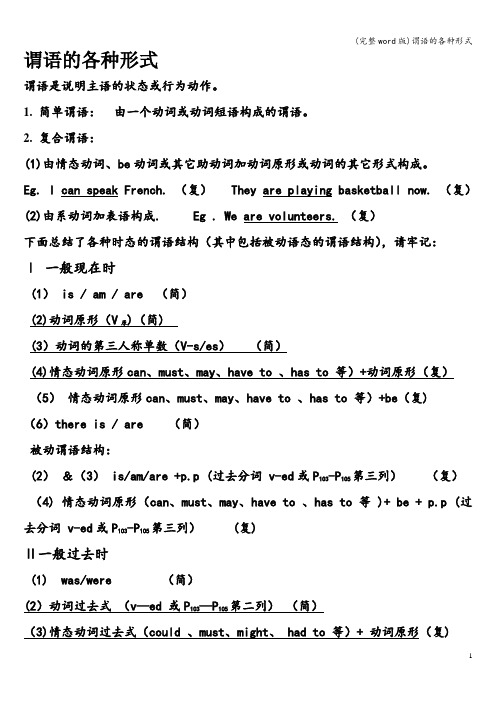
谓语的各种形式谓语是说明主语的状态或行为动作。
1.简单谓语:由一个动词或动词短语构成的谓语。
2.复合谓语:(1)由情态动词、be动词或其它助动词加动词原形或动词的其它形式构成。
Eg. I can speak French. (复) They are playing basketball now. (复)(2)由系动词加表语构成. Eg . We are volunteers. (复)下面总结了各种时态的谓语结构(其中包括被动语态的谓语结构),请牢记:Ⅰ一般现在时(1) is / am / are (简)(2)动词原形(V原)(简)(3)动词的第三人称单数(V-s/es)(简)(4)情态动词原形can、must、may、have to 、has to 等)+动词原形(复)(5)情态动词原形can、must、may、have to 、has to 等)+be(复)(6)there is / are (简)被动谓语结构:(2)&(3) is/am/are +p.p (过去分词 v-ed或P103-P105第三列)(复)(4) 情态动词原形(can、must、may、have to 、has to 等 )+ be + p.p (过去分词 v-ed或P103-P105第三列) (复)Ⅱ一般过去时(1) was/were (简)(2)动词过去式(v—ed 或P103—P105第二列)(简)(3)情态动词过去式(could 、must、might、 had to 等)+ 动词原形(复)(4)情态动词过去式(could 、must、might、 had to 等)+be(复)(5) there was/were(复)被动语态:(2) was/were + p。
p (过去分词 v—ed或P103—P105第三列)(复)(3)情态动词过去式(could 、must、might、 had to 等)+ be+ p.p (过去分词 v-ed或P103-P105第三列) (复)Ⅲ现在完成时(1)has/have + been (2) has/have + p。
(完整word版)英语“三单形式”详解
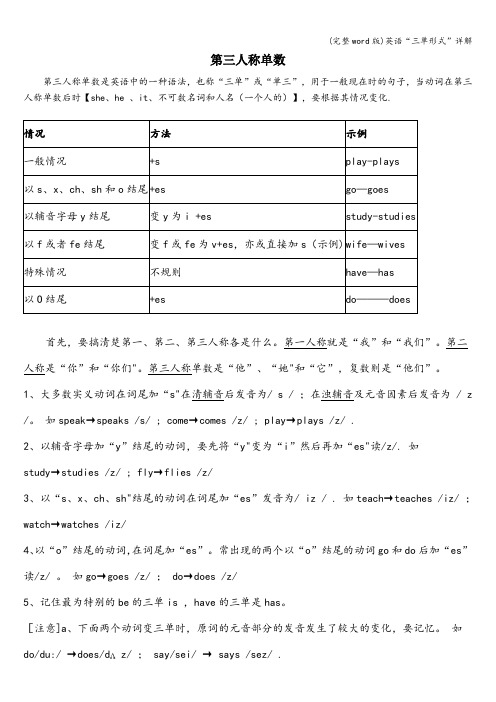
第三人称单数首先,要搞清楚第一、第二、第三人称各是什么。
第一人称就是“我”和“我们”。
第二人称是“你”和“你们"。
第三人称单数是“他”、“她"和“它”,复数则是“他们”。
1、大多数实义动词在词尾加“s"在清辅音后发音为/ s / ;在浊辅音及元音因素后发音为 / z /。
如speak→speaks /s/ ; come→comes /z/ ; play→plays /z/ .2、以辅音字母加“y”结尾的动词,要先将“y"变为“i”然后再加“es"读/z/. 如study→studies /z/ ; fly→flies /z/3、以“s、x、ch、sh"结尾的动词在词尾加“es”发音为/ iz / . 如teach→teaches /iz/ ;watch→watches /iz/4、以“o”结尾的动词,在词尾加“es”。
常出现的两个以“o”结尾的动词go和do后加“es”读/z/ 。
如go→goes /z/ ;do→does /z/5、记住最为特别的be的三单is ,have的三单是has。
[注意]a、下面两个动词变三单时,原词的元音部分的发音发生了较大的变化,要记忆。
如do/du:/ →does/dʌz/ ;say/sei/ → says /sez/ .b、以不发音字母“e”结尾的开音节词,如果尾音是[s][z]时加“s”后字母“e”发音与所加“s” 一起读做[iz]. 如:close→closes [iz]。
在中文中第三人称单数的三个“他"写法不一样,读音却相同。
但在英语中,三个“他”既有不同的读音,也有不同的写法,分别是he, she, it。
在第三人称后不能使用动词的原形,而要在相应的动词后加s或es.简单地讲,一个人就是单数,多于一个人就是复数。
在咱们汉语里,第三人称复数也就是常说的“他们”或者“她们”,英语中就是they。
英语动词第三人称单数形式的变化规则

英语动词第三人称单数变化规则一般现在时的肯定句中,主语为第三人称单数的动词变化主要体现在词尾的变化上,其规律为:1、变否定句:含有动词第三人称单数形式的句子变否定句时,要在动词前面加上doesn’t 或does not,动词的第三人称单数形式要还原成原形:格式为doesn’t/does not + 动词原形,如:He goes to school at six in the morning. (变否定句)→He doesn't go to school at six in the morning.2、变一般疑问句:把含有动词第三人称单数形式的变成一般疑问句时,要借用助动词does,如:She goes home at five every day.→Does she go home at five every day--- Yes, she does./No, she doesn’t.3、对划线部分进行提问(变特殊疑问句):一般格式为Whxxx + 一般疑问句She goes home at five every day. (对划线部分提问)→When/What time does she go home every dayShe goes home at five every day. (对划线部分提问)→Who goes home at five every dayShe goes home at five every day. (对划线部分提问)→What does she do at five every day哪些主语是第三人称单数1、人称代词he, she, it;如:He likes watching TV. 他喜欢看电视。
She has lunch at twelve. 她十二点吃午餐。
It looks like a cat. 它看起来像只猫。
2、单个人名、地名或称呼作主语;是第三人称单数。
动词的第三人称单数形式优秀课件

He does word puzzles.
I do homework.
He goes hiking. I go swimming.
Hello! 你好!
He teaches me English.
I teach him Chinese.
se.
I study English.
在一般现在时的英语句子中,当主语是第三人称单数 (he, she, it, 单人名)时,动词要变成第三人称单数 形式。但在一般疑问句中,以does开头时,则要原形。
1. 一般直接加-s; cooks, makes, takes, sees, lives, writes….
2. 以o结尾的加-es, 发/z/音; does, goes…
3. 以ch, sh, s, x结尾的加-es, 发/iz/音; teaches, watches, washes, pushes, misses, fixes… 4. 辅音字母加y结尾的要改y为i再加-es;
study-studies; carry-carries; worry-worries… 5. 不规则变化。
I play with my friends. My dad _g_iv_e_s_ me big hugs.
I give him little kisses. My dad _r_e_a_d_s_t_h_e_n_e_w__s_p_a_p_e_r_.
I draw pictures for him. My dad _l_o_v_e_s_ my mom.
have-has
My pen pal and I
----by John
He is my pen pal.
His name is John, too.
word完整版英语第三人称单数知识总结点学习计划,文档
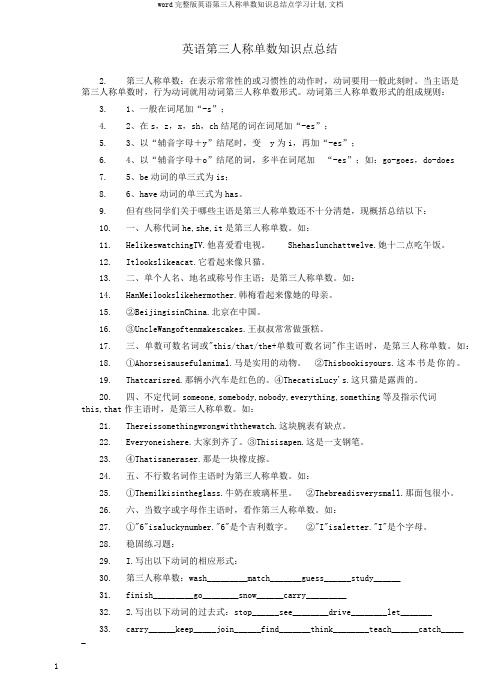
英语第三人称单数知识点总结2.第三人称单数:在表示常常性的或习惯性的动作时,动词要用一般此刻时。
当主语是第三人称单数时,行为动词就用动词第三人称单数形式。
动词第三人称单数形式的组成规则:3.1、一般在词尾加“-s”;4.2、在s,z,x,sh,ch结尾的词在词尾加“-es”;5.3、以“辅音字母+y”结尾时,变y为i,再加“-es”;6.4、以“辅音字母+o”结尾的词,多半在词尾加“-es”;如:go-goes,do-does7.5、be动词的单三式为is;8.6、have动词的单三式为has。
9.但有些同学们关于哪些主语是第三人称单数还不十分清楚,现概括总结以下:10.一、人称代词he,she,it是第三人称单数。
如:11.HelikeswatchingTV.他喜爱看电视。
Shehaslunchattwelve.她十二点吃午饭。
12.Itlookslikeacat.它看起来像只猫。
13.二、单个人名、地名或称号作主语;是第三人称单数。
如:14.HanMeilookslikehermother.韩梅看起来像她的母亲。
15.②BeijingisinChina.北京在中国。
16.③UncleWangoftenmakescakes.王叔叔常常做蛋糕。
17.三、单数可数名词或"this/that/the+单数可数名词"作主语时,是第三人称单数。
如:18.①Ahorseisausefulanimal.马是实用的动物。
②Thisbookisyours.这本书是你的。
19.Thatcarisred.那辆小汽车是红色的。
④ThecatisLucy's.这只猫是露茜的。
20.四、不定代词someone,somebody,nobody,everything,something等及指示代词this,that作主语时,是第三人称单数。
如:21.Thereissomethingwrongwiththewatch.这块腕表有缺点。
word可数吗
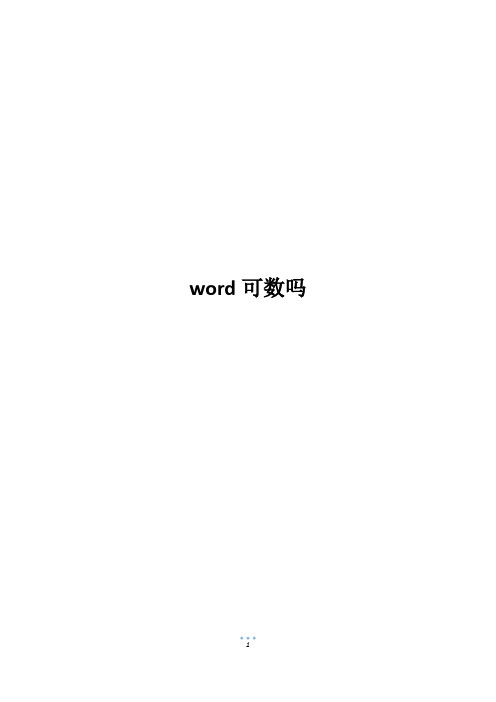
word可数吗word既是可数名词又是不可数名词。
word作为“一件作品”的意思时为可数,作“工作量”时为不可数。
word主要用作名词和动词,作名词译为“单词;话语;消息;诺言;命令”;作动词译为“用言辞表达”。
一、word词态变化第三人称单数:words复数:words现在分词:wording过去式:worded过去分词:worded二、word用法说明1.word的基本意思是“单词”,指语言中能独立存在的最小表意单位,也可指“(说的)话,话语,言语,谈话”等,是可数名词。
2.word也可作“消息,信息,谣言”“口令,号令,命令”等解,通常用作单数形式,作“消息,信息,谣言”解时,一般不与冠词连用,但作“口令,号令,命令”解时,可与定冠词the连用。
3.word还可作“诺言,保证”解,既可用作可数名词,也可用作不可数名词。
4.word还可指《圣经》,尤指“福音”,作此解时通常用作单数形式,并与定冠词the连用,首字母大写。
5.word用作动词的意思是“用词语表达”,也可作“选用”解。
6.word既可用作及物动词,也可用作不及物动词。
用作及物动词时,接名词或代词作宾语,可用于被动结构。
7.word的过去分词worded可用作形容词,在句中作定语。
三、word短语搭配in other word换句话说;也就是说in a word总之;简言之one word一个字;一句话last word最后一句话四、word双语例句1.Just say the word, and I'll go.只要发句话,我就走。
2.That's a word I never use.那是我从来不用的字眼。
3.I could hear every word they said.他们说的每句话我都能听见。
4.Word always gets out no matter how careful you are.无论你多么小心,总会有消息走漏。
(完整word)动词过去式、过去分词、现在分词

(完整word)动词过去式、过去分词、现在分词动词一、五种基本形式:英语中实义动词和系动词有五种基本形式,原形、现在式(用于第三人称单数)、过去式(用于过去时态)、过去分词(用于各种完成时态)和现在分词(用于各种进行时态)。
二、动词时态定义:时态是谓语动词所表示的动作或情况发生时间的各种形式。
四类:一般时态、进行时态、完成时态和完成进行时态。
每一类时态都对应四种时间:过去、现在、将来、过去将来。
常用8种时态:一般现在时,一般过去时,一般将来时,现在进行时,过去进行时,现在完成时,过去完成时和过去将来时。
1、一般现在时常见频度副词有:always(总是,一直),often, usually, never, sometimes等地球围绕着太阳转:The earth moves around the sun。
表客观存在的真理或科学事实。
(完整word)动词过去式、过去分词、现在分词公交车来了:Here comes the bus。
以here, there等开始的倒装句,表示动作正在进行。
2、一般过去时有确定的时间状语,如:yesterday, two days ago, last+年/月/星期,the other day, just now, in the old days, the day before yesterday(前天),this morning/afternoon, at the age of+过去年龄段,when引导的状语从句(过去),at+过去时间点,in+过去的年份等。
3、一般将来时常用时间副词:tomorrow, soon,(today, tonight)时间状语短语:next year/week/month, in a few days, in the future等.构成:will/shall+动词原形,be going to+动词原形,表示打算和预测。
特殊情形:be to+动词原形,表示按计划或安排即将要发生的动作;有时也表示命令、禁止或可能性.如:She is to practice the piano tomorrow. 她明天将练习钢琴.用现在进行时表示按计划或安排将要发生的事.用一般现在时表示按规定或时间表预计要发生的事。
(完整word版)动词第三人称单数形式
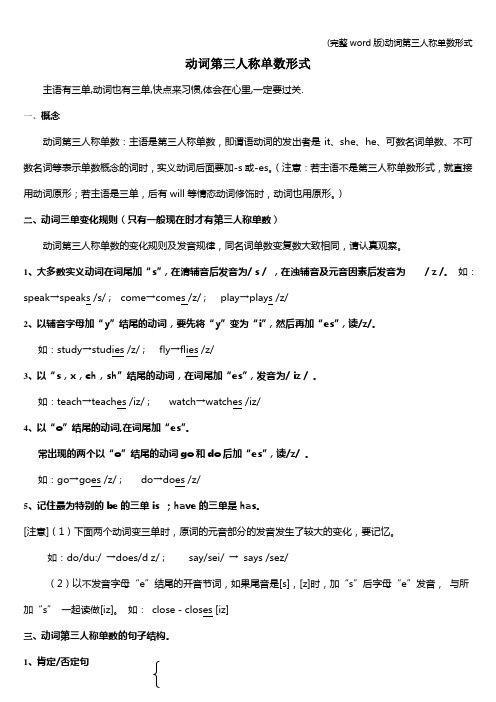
动词第三人称单数形式主语有三单,动词也有三单,快点来习惯,体会在心里,一定要过关.一、概念动词第三人称单数:主语是第三人称单数,即谓语动词的发出者是it、she、he、可数名词单数、不可数名词等表示单数概念的词时,实义动词后面要加-s或-es。
(注意:若主语不是第三人称单数形式,就直接用动词原形;若主语是三单,后有will等情态动词修饰时,动词也用原形。
)二、动词三单变化规则(只有一般现在时才有第三人称单数)动词第三人称单数的变化规则及发音规律,同名词单数变复数大致相同,请认真观察。
1、大多数实义动词在词尾加“s”,在清辅音后发音为/ s / ,在浊辅音及元音因素后发音为/ z /。
如:speak→speaks /s/ ; come→comes /z/ ; play→plays /z/2、以辅音字母加“y”结尾的动词,要先将“y”变为“i”,然后再加“es”,读/z/。
如:study→studies /z/ ; fly→flies /z/3、以“s,x,ch,sh”结尾的动词,在词尾加“es”,发音为/ iz / 。
如:teach→teaches /iz/ ; watch→watches /iz/4、以“o”结尾的动词,在词尾加“es”。
常出现的两个以“o”结尾的动词go和do后加“es”,读/z/ 。
如:go→goes /z/ ; do→does /z/5、记住最为特别的be的三单is ;have的三单是has。
[注意](1)下面两个动词变三单时,原词的元音部分的发音发生了较大的变化,要记忆。
如:do/du:/ →does/d z/ ; say/sei/ →says /sez/(2)以不发音字母“e”结尾的开音节词,如果尾音是[s],[z]时,加“s”后字母“e”发音,与所加“s” 一起读做[iz]。
如:close-closes [iz]三、动词第三人称单数的句子结构。
1、肯定/否定句三单+is +表语 . 三单+动词第三人称单数+其他 .三单+is+not+表语 . 三单+doesn't +动词原形+其他 .2、一般疑问句1)当谓语动词是be动词时,一般疑问句结构为“Is+三单+表语?”。
完整word版,人称代词所属格

人称代词所属格人称代词所属格.人称代词表人称主格 be 动词及其所有have/has及其否助动词及其宾格否定形式格,定形式否定形式形容性物主代词第一人称我I am/am not my have/haven ’t do/don ’t me 单第二人称你you are/aren ’t your have/haven ’t do/don ’t you 数第三人称他he is/isn’t his has/hasn ’t does/doesn ’t him 她she is/isn ’t her has/hasn ’t does/doesn ’t her它it is/isn’t its has/hasn ’t does/doesn ’t it人名人名is/isn’t 人has/hasn ’t does/doesn ’t人名名’sus 第二人称你们you are/aren ’t your have/haven ’t do/don ’t you第三人称他们,她 they are/aren’t their have/haven ’t do/don ’t them 们,它们注意:主格作主语 ,其中 she指带代国家 ,it 可指代天气时间等。
宾格作宾语,介词宾语,表语。
动词后面用人称宾格形容词性物主代词作定语。
名词性物主代词作主语 ,宾语 ,介词宾语 ,表语书信 yours 表示 ---- 的,这样的词我们也学习很多了,你能想出来吗?记住这个小口诀就很容易了:我的 my ,你的 your,他的his、她的 her. //它的是 its; 我们的our; 你们的是 your 他们 (它们 ,她们 )的是 their// 这些人称代词形式称为人称代词所属格 ,也叫形容词性物主代词。
通常用在名词前面表示所属关系。
另外,表示某人的还可以用名词或人名 + ’s 来表示。
如 :my kite; your book; his pen; her coat; its tail; our class;their teachers; my brother’ s; book; the cat’s ears; Mary ’s mother 一 .写出下列人称代词的所属格形式I________you _________he ______________She _________it____________ we _____________You _________they_________二 .用合适的人称代词填空(1)This is Ben. This is _______bicycle.(2)I am Kitty. ______ bag is blue(3) She’ sAlice. That ’ s umbrella.(4)You are Mr Li. ______ car is black.(5)Is this ______ hat? Yes, it ’mys hat.(6) That ’mys mother. That ’ s coat.(7)Where’ s______ scarf? Here you are.(8)He’ sMr Wang. _____ gloves are new.三.翻译下列词组1. 你的名字 _____________2.我们班 ___________3. 他的小弟弟 ____________4.我祖母 ___________5. 它的尾巴 ______________6.我的鞋 ____________7. 她的围巾 ________________ 8.我的衬衫 _________9.他们的老师 ______________ 10.玛丽的雨伞 _________四.用下列单词组句1.___________________________( my , is, name , Tom)2.____________________________(is, miss, Gao, our, friend)3.____________________________(is what, your number, telephone)4 .____________________________?(mother, your ,a teacher , is)5. ___________________________?( who’ s, cap , it , is)。
动词的五种变化规则表(参考模板)

第一人称单数第二人
称单数
第三人称单数第一人称
复数
第二人称
复数
第三人称复数阳性阴性中性
主格I you he she it we you they
宾格me you him her it us you them
形容词性
物主代词
my your his her its our your their 名词性mine yours his hers its ours yours theirs
规则变化:
(1)单音节和部分双音节形容词和副词,在原级的后面加上er,est构成比较级和最高级。
a)直接加er,est :b)以重读闭音节结尾的,要双写最后一个辅音字母,后加er,est:
c)以辅音字母+y结尾的,先把y改为i再加上er,est:
(2)两个音节或两个以上的音节的,在原级前加more / most.
3、不规则变化:。
英语动词第三人称单数

“ L”在“O”前面.
第十三页,共32页。
专项习题精练 (着眼高分 查漏补缺)
用括号中所给动词的 适当形式填空
第十四页,共32页。
1. Jack__l_o_v_e_s_ (love) his mother very much.
2. Mary and Lily__c_o_m__e (come) from the same country.
5.Does Danny__s_e_e_(see)the aoole tree? 6._D_o_e_s_she_c_o_m_e_(come)from America?
Yes,she__d_o_e_s.
7._D_o_e_s_the girl_l_o_o_k_(look)out of the window and sees many birds in the sky? No,she__d_o_e_s. n’t 8._D_o_e_s_Jenny run home and___s_i_t(sit)on
word?does
spell
第二十四页,共32页。
否定句:在动词前+doesn't或don't.
• 1.She_d_o_e_sn_’t___d_o_(do)her homework every day.
• 2.He_do_e_s_n_’t__li_v_e_(live)in ShangHai. • 3.Hed_o_e_s_n_’t__ne_e_d_(need)a pair pf shoes. • 4.Danny_d_oe_s_n_’t__s_e_e_(see)the apple tree? • 5.She_d_o_e_sn_’t__c_om__e(come)from America. • 6.The girld_o_e_s_n_’t__lo_o_k_(look)out of the window
- 1、下载文档前请自行甄别文档内容的完整性,平台不提供额外的编辑、内容补充、找答案等附加服务。
- 2、"仅部分预览"的文档,不可在线预览部分如存在完整性等问题,可反馈申请退款(可完整预览的文档不适用该条件!)。
- 3、如文档侵犯您的权益,请联系客服反馈,我们会尽快为您处理(人工客服工作时间:9:00-18:30)。
动词第三人称单数形式主语有三单,动词也有三单,快点来习惯,体会在心里,一定要过关.一、概念动词第三人称单数:主语是第三人称单数,即谓语动词的发出者是it、she、he、可数名词单数、不可数名词等表示单数概念的词时,实义动词后面要加-s或-es。
(注意:若主语不是第三人称单数形式,就直接用动词原形;若主语是三单,后有will等情态动词修饰时,动词也用原形。
)二、动词三单变化规则(只有一般现在时才有第三人称单数)动词第三人称单数的变化规则及发音规律,同名词单数变复数大致相同,请认真观察。
1、大多数实义动词在词尾加“s”,在清辅音后发音为/ s / ,在浊辅音及元音因素后发音为/ z /。
如:speak→speaks /s/ ; come→comes /z/ ; play→plays /z/2、以辅音字母加“y”结尾的动词,要先将“y”变为“i”,然后再加“es”,读/z/。
如:study→studies /z/ ; fly→flies /z/3、以“s,x,ch,sh”结尾的动词,在词尾加“es”,发音为/ iz / 。
如:teach→teaches /iz/ ; watch→watches /iz/4、以“o”结尾的动词,在词尾加“es”。
常出现的两个以“o”结尾的动词go和do后加“es”,读/z/ 。
如:go→goes /z/ ; do→does /z/5、记住最为特别的be的三单is ;have的三单是has。
[注意](1)下面两个动词变三单时,原词的元音部分的发音发生了较大的变化,要记忆。
如:do/du:/ →does/d z/ ; say/sei/ →says /sez/(2)以不发音字母“e”结尾的开音节词,如果尾音是[s],[z]时,加“s”后字母“e”发音,与所加“s” 一起读做[iz]。
如:close-closes [iz]三、动词第三人称单数的句子结构。
1、肯定/否定句三单+is +表语. 三单+动词第三人称单数+其他.三单+is+not+表语 . 三单+doesn't +动词原形+其他.2、一般疑问句1)当谓语动词是be动词时,一般疑问句结构为“Is+三单+表语?”。
它的肯定回答为:Yes, 三单+is. ;否定回答为:No,三单+isn't.。
2)当谓语动词是实义动词时,在肯定句句首加助动词does,即“Does+三单+动词原形+ 其他?”。
它的肯定回答为:Yes,三单+does.;否定回答为:No,三单+doesn't.。
3、特殊疑问句特殊疑问词+一般疑问句四、要点1)一定要看准句子的主语是第三人称而且还是单数;2)经常与频率副词连用:always (一直,总是),usually(通常),often (经常),sometimes (有时),seldom (很少),hardly (几乎不),never (从不),once a day (一天一次),twicea week(一周两次),three times a month(一个月三次)。
如:I often speak Chinese. 我经常说汉语。
练习题I、写出下列动词的第三人称单数。
go do buy draw shoutplay teach make catch findswim jump begin dig helpmiss sing finish give keepdance worry sit hear matchget have love learn cryfly study come call smilebe write stop open checklook drink leave read pickeat walk start tell pushdie ________ live ________ show vote judgebuy _____ carry______ borrow listen washII、用动词的正确形式填空。
1、I _____ (go) home by bus.2、Jack ______(go) home by bike.3、When ______(do)he get up?4、Her mum ______(run) to the goose.5、He________(do not)like apples.6、Sam______(put) it under his arm.7、The boy_______(chase) it. 8、Kitty______(watch)TV everyday.9、John can’t______(find) his watch. 10、Where _____(do)Grandma live?11、Miss Wang___(live) in America now. 12、The girls___(give) the key to Sally.13、That key ______(open) the old box. 14、She ______(say) “I like these puppets”.15、What_____(do)Alice find? 16、Which toy_____(do) she like?17、He doesn’t______(know)her name. 18.、Mike ________( cook ) in a restaurant .19、He_______( speak ) Japanese . 20、How does he______(go)to the post office? 21、He often ______( have ) dinner at home . 22、Liu Tao ____ ( do ) not like PE(体育).23、She ______(do) homework by herself. 24、They _____ (do) homework by themselves.25、Kate _____ (walk) to school every day.26、Lucy and Lily ______ (walk) to school every day.27、David and Ben ______(be ) in Class Four ,Grade Seven .28、The girl ___________(teach)us English on Sundays.29、He______(feed)them at 8:00 in the morning.30、She ____( ride ) to school from Monday to Friday .31、We _____________ (not watch ) TV on Sunday .32、Su Hai and Su Yang _____(work ) in a shop(在商店).33、There______( be) some water in the bottle(瓶子).34、The giant(巨人)______(climb) up the beanstalk(豆茎).35、Michael usually_____ (listen) to the radio in the morning.III、选择正确的单词填到括号里。
1、What does Candy __________(wants, want ) to be ?2、He shouldn't __________ (throw, throws ) rubbish on the floor(草地).3、Peter ____________ (help, helps ) his mother with the housework(家务).4、She never __________(run, runs ) in the library(图书馆).5、We will _________(fly, flies ) kites on this Sunday .6、Tom and Mary _________(has, have ) pen pals in China .7、They _________(speaks, speak ) English after class.8、He _________(don't , doesn't ) get up early .9、What _________( do, does ) your father do ?10、Let us ___________(fly , flies ) kites on this Friday afternoon .IV、将下列句子改为第三人称He的句型(看例句)。
例句:I brush my teeth once a day .→He brushes his teeth once a day .1、I come from China. ___________________________________________2、You have a big black knife. _________________________________________3、What do you do ? __________________________________________________4、Our parents work in an office . ___________________________________________5、What color are your clothes ?_____________________________________________ V、A:用括号里所给词的适当形式。
1、The desk _________ ________ (have)four legs.2、She _____ _____ (do) her homework every day.3、Danny______ ______ (fall) and breaks his tail.4、He _____ _______ (live) in Shijiazhuang.5、He ______ _____ (need) a pair of shoes.6、Danny_______ _______ (see) the apple tree.7、She_______ _______ (come) from America.8、My mother and father_______ ______ (walk) to the office every day.9、Danny and her mother sometimes ______ _______ (go) for a walk after supper.10、The train______ ______ (leave) at 10:13 am.11、That hat ______ _______ (look) like a cat.12、Danny ______ ______ (hurt) his nose.B:用括号里所给词的适当形式。
